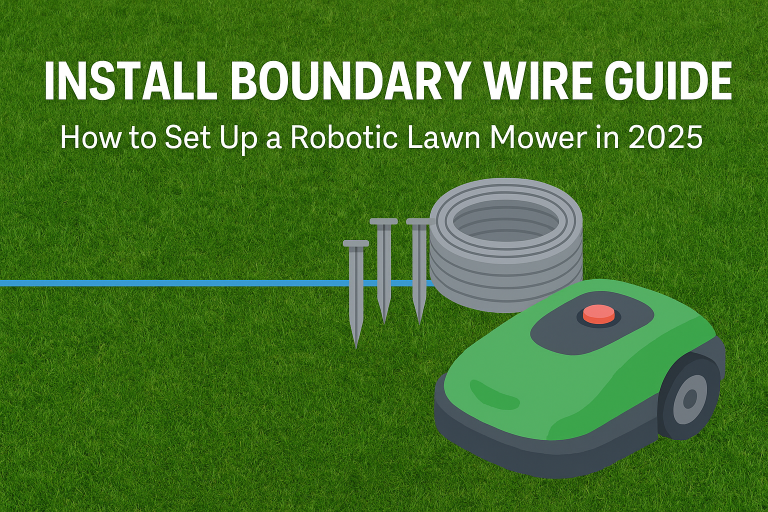Install Boundary Wire Guide: How to Set Up a Robotic Lawn Mower

Installing the boundary wire is a crucial first step in getting your robotic lawn mower up and running. It tells the mower where to cut — and just as importantly, where not to. This guide will walk you through everything you need to know to install boundary wire like a pro.
🛠️ What You’ll Need
- Boundary wire (usually included with your mower)
- Wire stakes or pegs
- Wire connectors (for larger installations or repairs)
- Rubber mallet (optional, for driving in stakes)
- A tape measure or long measuring rope
- Boundary wire planning template or sketch of your lawn
📏 Step 1: Plan Your Layout
Sketch your lawn and identify:
- Lawn edges and borders
- Obstacles like trees, flowerbeds, trampolines, or garden ponds
- Charging station location (ideally flat, shaded, and near a power outlet)
Tip: Keep the boundary wire at least 12–16 inches (30–40 cm) away from walls, flowerbeds, or other hard edges to prevent blade damage.
🔄 Step 2: Lay the Boundary Wire
Start at the charging station and begin unrolling the wire clockwise around your lawn perimeter.
Make sure the wire:
- Is held down with pegs every 30 inches (75 cm)
- Stays taut and low to the ground (especially if you’re not burying it)
- Loops clockwise around flowerbeds or obstacles to create exclusion zones
For pass-through zones (like between front and back yards), use guide wires — many mowers support this.
⚡ Step 3: Connect to Charging Station
Both ends of the boundary wire should return to the charging base. Most mowers have labeled terminals for "Left" and "Right." Firmly connect the wire ends, and check for signal integrity — your mower’s app or LED display will show connection status.
🌿 Step 4: Test and Adjust
Power on your mower and start a test mow. Watch closely:
- Does it stay inside the boundary?
- Does it avoid sensitive areas?
- Is it catching corners or getting stuck?
Make minor adjustments to the wire layout as needed. Stakes can be easily repositioned, and over time the grass will grow over the wire, making it invisible.
🚫 Common Mistakes to Avoid
- Placing wire too close to obstacles: This may cause blade damage or mower collisions.
- Loose wire loops: Can snag blades or cause navigation errors.
- Skipping the test run: You won’t know if your setup works until you see it in action.
✅ Final Thoughts
Installing boundary wire may seem intimidating, but with the right approach, you can have it done in a couple of hours. It's a one-time setup that ensures years of hassle-free mowing with your robot. Still deciding which mower is best for your lawn? Use our comparison tool to find the perfect model for your setup.